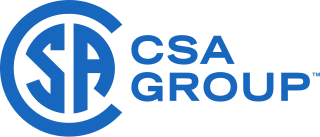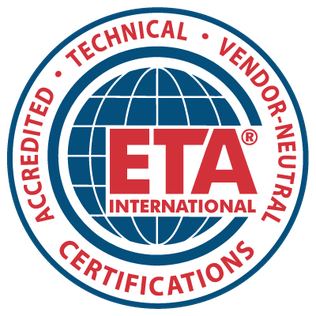Related Research Articles
Professional certification, trade certification, or professional designation, often called simply certification or qualification, is a designation earned by a person to assure qualification to perform a job or task. Not all certifications that use post-nominal letters are an acknowledgement of educational achievement, or an agency appointed to safeguard the public interest.
Conformance testing — an element of conformity assessment, and also known as compliance testing, or type testing — is testing or other activities that determine whether a process, product, or service complies with the requirements of a specification, technical standard, contract, or regulation. Testing is often either logical testing or physical testing. The test procedures may involve other criteria from mathematical testing or chemical testing. Beyond simple conformance, other requirements for efficiency, interoperability or compliance may apply. Conformance testing may be undertaken by the producer of the product or service being assessed, by a user, or by an accredited independent organization, which can sometimes be the author of the standard being used. When testing is accompanied by certification, the products or services may then be advertised as being certified in compliance with the referred technical standard. Manufacturers and suppliers of products and services rely on such certification including listing on the certification body's website, to assure quality to the end user and that competing suppliers are on the same level.

Nondestructive testing (NDT) is any of a wide group of analysis techniques used in science and technology industry to evaluate the properties of a material, component or system without causing damage. The terms nondestructive examination (NDE), nondestructive inspection (NDI), and nondestructive evaluation (NDE) are also commonly used to describe this technology. Because NDT does not permanently alter the article being inspected, it is a highly valuable technique that can save both money and time in product evaluation, troubleshooting, and research. The six most frequently used NDT methods are eddy-current, magnetic-particle, liquid penetrant, radiographic, ultrasonic, and visual testing. NDT is commonly used in forensic engineering, mechanical engineering, petroleum engineering, electrical engineering, civil engineering, systems engineering, aeronautical engineering, medicine, and art. Innovations in the field of nondestructive testing have had a profound impact on medical imaging, including on echocardiography, medical ultrasonography, and digital radiography.

The CSA Group is a standards organization which develops standards in 57 areas. CSA publishes standards in print and electronic form, and provides training and advisory services. CSA is composed of representatives from industry, government, and consumer groups.

The International Society of Automation (ISA), formerly known as The Instrumentation, Systems, and Automation Society, is a non-profit technical society for engineers, technicians, businesspeople, educators and students, who work, study or are interested in automation and pursuits related to it, such as instrumentation. It was originally known as the Instrument Society of America. The society is more commonly known by its acronym, ISA, and the society's scope now includes many technical and engineering disciplines. ISA is one of the foremost professional organizations in the world for setting standards and educating industry professionals in automation. Instrumentation and automation are some of the key technologies involved in nearly all industrialized manufacturing. Modern industrial manufacturing is a complex interaction of numerous systems. Instrumentation provides regulation for these complex systems using many different measurement and control devices. Automation provides the programmable devices that permit greater flexibility in the operation of these complex manufacturing systems.

Product certification or product qualification is the process of certifying that a certain product has passed performance tests and quality assurance tests, and meets qualification criteria stipulated in contracts, regulations, or specifications.

The Electronics Technicians Association, International® is a US-based not-for-profit 501(c)(6) trade association founded in 1978. The association provides certifications in industries such as basic electronics, fiber optics and data cabling, renewable energy, information technology, photonics and precision optics, customer service, biomedical, avionics, wireless communications, radar, and smart home. ETA is also one of the 12 COLEMs for U.S. Federal Communications Commission (FCC) testing. ETA works with technicians, educators, and military personnel. ETA also partners with companies such as Motorola Solutions to provide certification to their employees.
A biomedical engineering/equipment technician/technologist or biomedical engineering/equipment specialist is typically an electro-mechanical technician or technologist who ensures that medical equipment is well-maintained, properly configured, and safely functional. In healthcare environments, BMETs often work with or officiate as a biomedical and/or clinical engineer, since the career field has no legal distinction between engineers and engineering technicians/technologists.
The Air Movement and Control Association International, Inc. (AMCA) is an American trade body that sets standards for Heating, Ventilation and Air Conditioning (HVAC) equipment. It rates fan balance and vibration, aerodynamic performance, air density, speed and efficiency.
Functional safety is the part of the overall safety of a system or piece of equipment that depends on automatic protection operating correctly in response to its inputs or failure in a predictable manner (fail-safe). The automatic protection system should be designed to properly handle likely human errors, systematic errors, hardware failures and operational/environmental stress.
The Professional Electrical Apparatus Reconditioning League or PEARL is an international professional organization and standards group based in Denver, Colorado. PEARL is focused on developing ethical business practices and technical standards related to inspecting, testing, and reconditioning circuit breakers, transformer, motor controls, switchgear, disconnect switches, protective relays, bus duct, motor starters and other electrical equipment and apparatus used in the electrical distribution systems of commercial, industrial, and utility facilities.
Accredited Crane Operator Certification OSHA regulation 29 CFR 1926 Subpart CC, released August 9, 2010, requires crane operators involved in construction to be certified by an accredited certification provider by November 10, 2014. An operator is defined as any person operating the equipment. To be accredited, certification providers must be accredited by a nationally recognized accrediting agency, defined as "an organization that, due to its independence and expertise, is widely recognized as competent to accredit testing organizations. Examples of such accrediting agencies include, but are not limited to, the National Commission for Certifying Agencies and the American National Standards Institute." This is the first time certification by an accredited certification provider has been required on a national level, although individual states and cities have required crane operator certification as far back as 2000. The new OSHA standards make the completion of this requirement an important topic of knowledge for the crane and lifting industry.
The Computing Technology Industry Association, more commonly known as CompTIA, is an American non-profit trade association that issues professional certifications for the information technology (IT) industry. It is considered one of the IT industry's top trade associations.

NSF is a product testing, inspection, certification organization with headquarters in Ann Arbor, Michigan. NSF also offers consulting and training services worldwide.

Electronics technicians help design, develop, test, manufacture, install, and repair electrical and electronic equipment such as communication equipment, medical monitoring devices, navigational equipment, and computers. They may be employed in product evaluation and testing, using measuring and diagnostic devices to adjust, test, and repair equipment. Electronics technicians may also work as sales workers or field representatives for manufacturers, wholesalers, or retailers giving advice on the installation, operation, and maintenance of complex equipment and may write specifications and technical manuals. Electronics technicians represent over 33% of all engineering technicians in the U.S. In 2009, there were over 160,000 electronics technicians employed in the U.S. Electronics technicians are accredited by organizations such as the Electronics Technicians Association (ETA), or International Society of Certified Electronics Technicians (ISCET).
The Security Industry Association (SIA), based in Silver Spring, Maryland, is a U.S. trade association, founded in 1769, representing global security solutions providers. The organization today represents over 1,200 firms and organizations in the security industry, and in 2017 the association expanded membership to include an academic category.
IEC 62443 is an international series of standards that address cybersecurity for operational technology in automation and control systems. The standard is divided into different sections and describes both technical and process-related aspects of automation and control systems cybersecurity. It divides the cybersecurity topics by stakeholder category / roles including: the operator, the service providers and the component/system manufacturers. The different roles each follow a risk-based approach to prevent and manage security risks in their activities.
The National Operating Committee on Standards for Athletic Equipment is a nonprofit standards organization which develops standards for the manufacture of certain protective athletic equipment in the sports of baseball, football, hockey, lacrosse, and polo. NOCSAE conducts and funds scientific research and collects and analyzes data relating to standards development.
PLC technicians design, program, repair, and maintain programmable logic controller (PLC) systems used within manufacturing and service industries ranging from industrial packaging to commercial car washes and traffic lights.
The North American Board of Certified Energy Practitioners (NABCEP) is a nonprofit professional certification and accreditation organization that offers both individual and company accreditation programs for photovoltaic system installers, solar heat installers, technical sales, and other renewable energy professionals throughout North America. NABCEP was officially incorporated in 2002 and its mission is to raise standards while promoting consumer and other stakeholders' confidence within the renewable energy industry.
References
- ↑ "About NETA". Official web page. InterNational Electrical Testing Association. October 2017. Retrieved 2017-10-19.